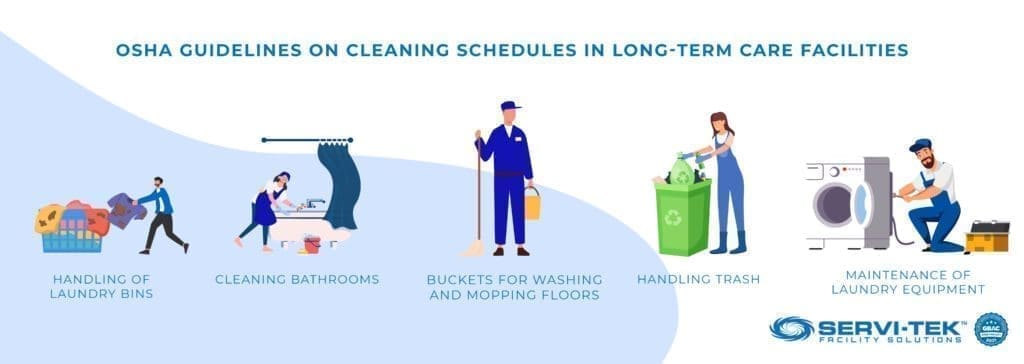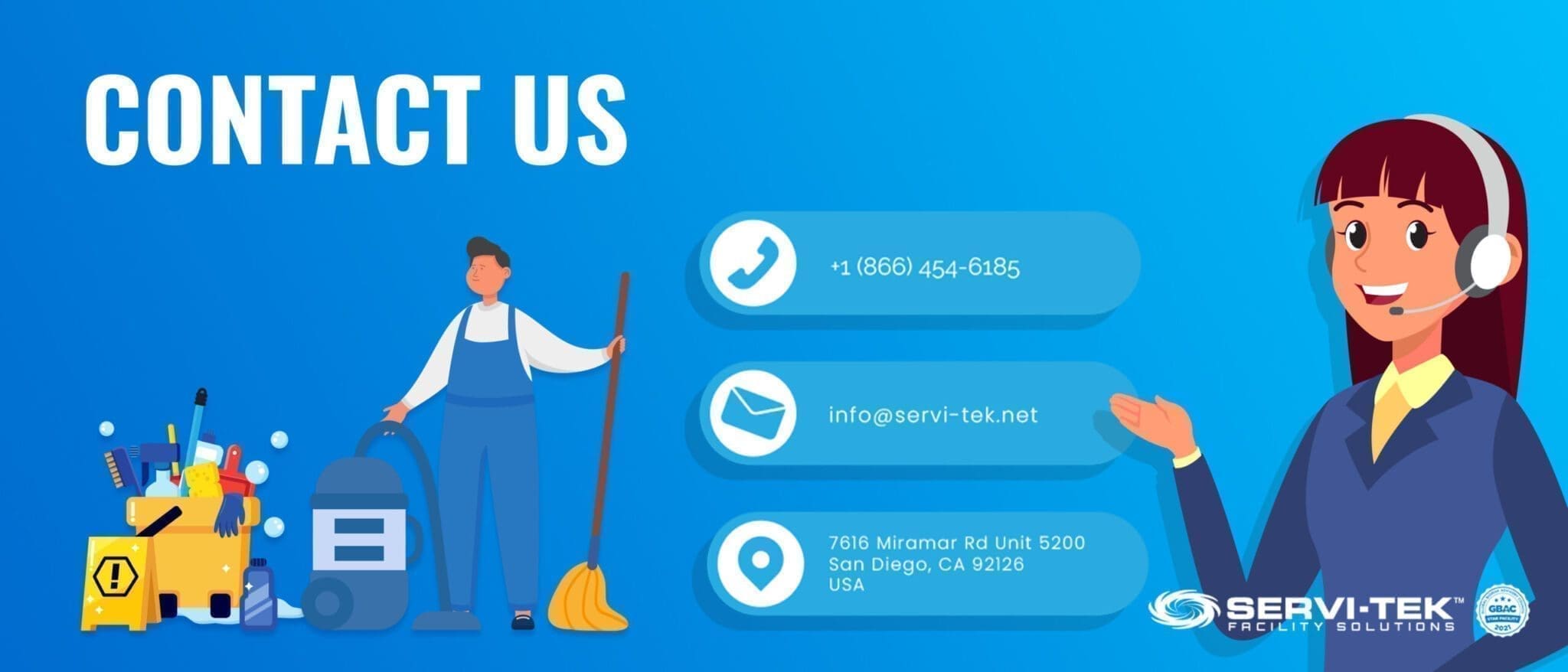
The need for keeping an assisted living facility sparkling clean and disinfected cannot be stressed enough. Bright, fresh, and pathogen-free rooms are vital to the health of your residents, staff, and visitors. Whether you head up the housekeeping or manage the property, it is a good idea to review your existing cleaning guidelines and reset the schedules and frequency as required.
This post lists the proper way of cleaning an assisted living facility and outlines a handy checklist to make your task easier.
Properly Cleaning an Assisted Living Facility
Long-term care facilities are very busy and can harbor virus contaminants and germs. It is important for every resident room and all common areas to be addressed properly. You may need certain specific cleaning and disinfection solutions for specific surfaces and areas. Your goal should be to eradicate the pathogens completely and not just clean a hard surface for aesthetic reasons.
You should employ a checklist to clean an area so that nothing gets missed. You should regularly rotate water, rags, and mops to ensure that no cleaning tools are spreading germs around. You should consider employing electrostatic cleaning and disinfection methods. This is the perfect way of ensuring that all tight places, surfaces, and hard-to-reach spaces are contaminant free.
Cleaning Schedule for Assisted Living Facility
There are three sections to the average housekeeping duties checklist – daily, weekly, and monthly. These guidelines apply to both facility-wide spaces and residents’ rooms. You need to pay special attention to common areas and high-traffic areas, such as the dining room, common areas, and bathrooms.
This is a handy checklist to ensure nothing gets missed while cleaning and disinfecting the facility:
Daily Duties

These daily guidelines help in ensuring a healthy environment throughout the elder care home facility. You may want to consider a mild disinfectant to avoid exposing the residents to the dangerous effects of harsh chemicals. Many seniors have compromised immune systems and should only be exposed to chemicals allowed by the U.S. Environmental Protection Agency. It is recommended to choose a disinfectant mentioned on List N by the EPA. These are a few tasks that should be performed daily:
- Wipe down the surfaces in shared areas and individual rooms several times a day
- Disinfect high-touch areas, including handrails, light switches, door handles, cabinet handles, and shared electronics (phone, computer, and tablet)
- Vacuum carpets, sweep and mop hard floors, and inspect door mats for tripping hazards and signs of wear and tear
- Keep dirty dishes out of kitchens, check refrigerators for spoiled items, and wipe down appliances
- Clean and disinfect tubs, whirlpools, countertops, sinks, toilets, and bathroom showers
- Secure dirty linens in a fluid-resistant, heavy fabric bag and move them to the linen cart
- Keep trash bags at the collection point
Weekly Cleaning and Disinfection
These weekly duties will ensure that you are always ahead in big cleaning jobs. These tasks also offer the opportunity to confirm the safe operation and current condition of windows, doors, and light fixtures.
Weekly cleaning duties include:
- Vacuuming cushions and furnishings
- Wash drapes and clean blinds
- Check bulb type and wattage to ensure safe use
- Dust light fixtures
- Straighten up and clean refrigerators, kitchen cupboards, general supply storage areas, and pantries
- Polish sliding glass doors and windows inside out. Pay attention to glass room partitions and door windows.
- Clean metal and wood doors and door stops. Check the lock mechanism and hardware.
- Inspect floor and sink drains in kitchens and bathrooms for signs of mold, mildew, and clogs
Monthly Cleaning Schedule
You should determine your cleaning needs and outline a monthly cleaning project by working with your staff. Alternatively, you may also want to hire a commercial cleaning company to take care of these tasks once a month. Addressing these monthly tasks on a routine basis helps with weekly and daily tasks as well while maintaining a safe place.
The monthly cleaning checklist for assisted living facilities includes:
- Thoroughly cleaning the inside of pantries and cabinets
- Cleaning the interiors of kitchen appliances
- Checking food in refrigerators, pantries, and cabinets for expiration date and freshness
- Cleaning ceiling fans, overhead light fixtures, and fire sprinkler systems
- Checking the smoke alarms
- Wiping down baseboards and walls in all rooms
- Keeping an eye out for dampness as a result of hidden leaks
- Cleaning wall and ceiling air vents and grills
- Changing HVAC filters
- Steam cleaning area rugs and carpets
- Waxing and buffing hardwood floors
- It is recommended that all maintenance tasks be performed during monthly cleaning. Office spaces should also be cleaned during this time.
Pay Attention to Resident Needs

Staff working in senior living homes are tasked with several responsibilities. They have to take care of the clinical needs of residents while ensuring their space remains spotless and pathogen free. An effective cleaning schedule is necessary to prevent the staff from becoming too preoccupied with other responsibilities to miss out on their cleaning duties.
It can be easy to miss certain cleaning services to take care of other tasks. Clean toilets and kitchens are vital to the health of your residents. Missing out on cleaning tasks regularly can prove to be problematic.
However, it is important to create a cleaning schedule that honors the philosophy of care at an assisted living facility. Your cleaning schedule and frequency should be created only after keeping the following in mind:
- Choice: One resident may only want their linens changed once a week while other residents may want the apartment cleaned multiple times a week. Cleaning schedules should always pay attention to the resident’s considerations.
- Independence: There may be a few residents that don’t want housekeeping services or cleaners in their apartments. However, they may ask to borrow the vacuum. Such needs should be accommodated.
- Privacy: Simply because the residents are living in an assisted living facility doesn’t mean that their privacy doesn’t matter. The staff should always knock and information before entering an apartment to clean. They should ask the resident’s permission to avoid an invasion of privacy.
- Dignity and individuality: Adhering to a cleaning schedule contributes to the individual sense of dignity of each resident
- Homely environment: Facility managers should establish policies and procedures to create a home-like environment. All areas of the community should be transformed, including dining room floors and tables, the bistro, the arts and crafts room, parlors, and public bathrooms.
Schedules are guidelines and should be open to changes. This is especially important in a senior living facility. It is important to stay on schedule. However, it is equally important to be willing to work and remain flexible in case unplanned situations arise. The primary goal is to serve the preferences and needs of the residents. The cleaning schedule should be changed when the preferences and situations change.
OSHA Guidelines on Cleaning Schedules in Long-Term Care Facilities

There are no established rules or guidelines on how to keep a facility clean. Cleaning tasks are generally prioritized on attending to the most soiled area first. Cleaner areas are usually attended to last. The best approach to cleaning is to ensure the tasks are performed efficiently and safely. The main goal is to make sure the disinfection of residents’ spaces is carried out by following guidelines.
In the case of an in-house cleaning crew, you should prioritize speed, efficient cleaning, and safety. Individual staff members should not take more than 15 – 20 minutes in an apartment where daily cleaning is concerned. The staff should wash their hands before continuing to the next apartment once the cleaning is done. This step is vital to prevent the risk of transmission of infectious diseases and germs.
Staff can also be provided with personal protective equipment, including gloves. They should never wear the same gloves. They should be trained on other infection control standards as well. Senior living facilities should have written cleaning schedules as per OSHA. There should be policies and procedures in place discussing:
- Handling of laundry bins
- Process of cleaning bathrooms
- Handling buckets for washing and mopping floors
- Handling trash
- Maintenance of laundry processes and equipment
You should emphasize that different cleaning agents should not be mixed. You should have the staff participate in the daily monitoring of cleaning solutions and chemicals, including their labeling and storage. Orientation involving a hazardous chemical program should be attended by all staff members. A Hazard communication orientation program is mandatory before starting work.
Why Hire a Commercial Cleaning Company?
It is generally more efficient to outsource cleaning projects to commercial cleaners. You can save the expense of training staff members, renting/purchasing cleaning equipment, and investing in cleaning chemicals. It is always safer to leave the handling of industry-grade cleaning products to professionals when it comes to nursing homes.
These are a few other benefits to hire an experienced LTC facility cleaning contractor:
- You can prolong the life of frames and fabrics while keeping the interiors fresh by hiring professionals
- Experienced cleaners have the necessary equipment for stain protection treatments and deep cleaning of carpets and rugs
- Wall, floor, and tile counter cleaning includes deep grout disinfection
- You can maintain the healthy air quality in your assisted living facility with professionally cleaned duct systems
Talk to an Experienced Assisted Living Cleaning Contractor
There are unique housekeeping challenges in every long-term care facility. These guidelines can help so much with an in-house cleaning crew. You can ease your resources by hiring a professional and full boutique cleaning and facility maintenance company, like Servi-Tek.
Schedule an appointment today by calling (866) 454-6185 or using our online form.




